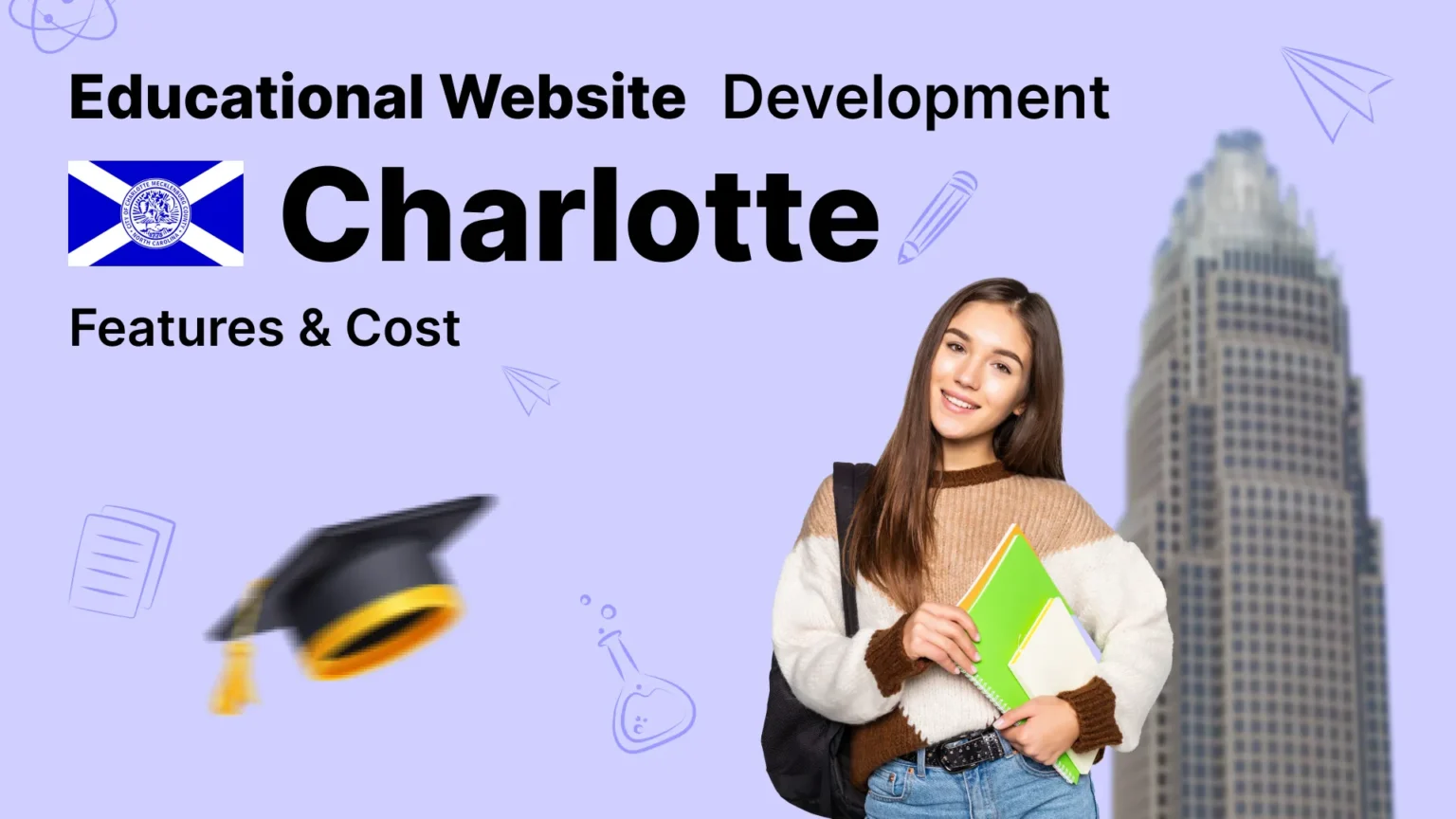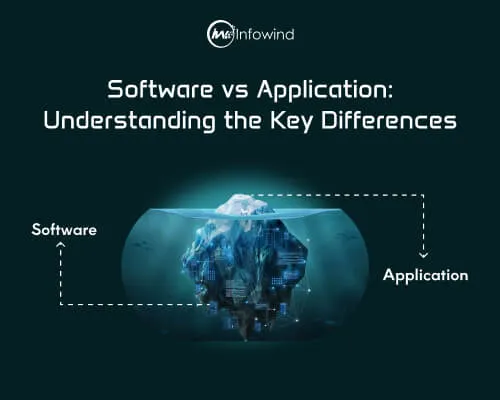Modern educational institutions must have a digital platform because it has become the mandatory foundation for success in the digital age. Online learning expansion in Charlotte prompts educational institutions, educators, and EdTech startups to convert to digital platforms to maximize learning opportunities and market expansion.
A market research report from Research and Markets indicates that the global e-learning sector will expand until 2030 when it will reach $848 billion with an annual growth rate of 17.5%. The emerging tech center of Charlotte demonstrates rapid growth in electronic learning adoption because local educational institutions, as well as universities and businesses, implement digital education components. The University of North Carolina Charlotte and Central Piedmont Community College demonstrate how institutions implement online education, which offers flexible learning possibilities.
An educational website provides several advantages to users through its accessible features, flexible structure, and interactive interface. Educational websites function as one central hub that distributes curriculum information, student platform resources, and admission details to both institutions and their learners. Learning platforms through website access help tutors deliver interactive educational resources and organize classes for individualized student guidance. The educational technology sector achieves monetary success by providing courses and certifications on subscription plans.
The future development of Charlotte’s educational sector depends on establishing well-constructed educational websites because these sites ensure continued digital relevance and market competitiveness.
Must-Have Features of an Educational Website
A functional educational website depends on outstanding content since it needs a user-friendly design together with electronic sophistication to present a seamless learning process. These fundamental components must be present in every educational website:
1. User-Friendly Interface & Responsive Design
Users must be able to access instructional websites from desktops as well as from tablets and smartphones. Students enjoy a trouble-free educational experience when they see a neat interface combined with straightforward navigation and fast site loading times.
2. Course Management System (CMS)
A quality Course Management System (CMS) provides tools to build courses and maintain them as well as arrange content in an orderly manner. A CMS helps instructors create programs of all types and fully online courses through its management capabilities, which lead to effective content management and learner-friendly delivery.
3. Interactive Learning Tools
Education today serves more purposes than delivering materials alone because it depends on student involvement. Learning effectiveness increases when students use quiz systems in combination with discussion tools, and video tutorials, along with gamified features, and performance analysis.
4. Student & Teacher Dashboards
The implementation of personalized dashboards delivers a better user experience through its role-based entry features. The platform shows teachers how students improve while allowing them to post resources and handle assignments in addition to providing students access to their classes and submission capabilities and feedback delivery.
5. Live Classes & Webinars Integration
Virtual learning in real time requires the foundational feature of live class integration that relies on Zoom, Google Meet, and Microsoft Teams. Through this feature, teachers maintain the ability to host live sessions and lead Q&A discussions together with the delivery of interactive learning environments.
6. Secure Payment Gateways
Any website that provides payment-based courses needs to integrate reliable payment systems from Stripe, PayPal, or Authorize.net. Customers can make secure payments through multiple available options, which maintains financial trust during transactions.
7. AI-Powered Personalization
The application of Artificial Intelligence provides individualized program advice that uses student interests in combination with their educational actions and their current academic development. AI-driven chatbots supply immediate academic assistance together with student guidance to learners.
8. SEO & Marketing Features
An educational website requires an SEO-friendly blog service together with email subscription forms as well as social media connectivity and content marketing solutions for higher organic traffic and increased visibility. The platform becomes an industry leader through these features, which simultaneously generate user participation.
9. Accessibility & Compliance
Inclusivity is crucial in education. ADA compliance (Americans with Disabilities Act) demands features such as text-to-speech options and keyboard navigation along with contrast adjustments that users with disabilities need.
A user-centric platform results from implementing essential features that build effective learning and engagement and allow for student growth on educational websites.
Cost of Developing an Educational Website in Charlotte
The expense of developing educational websites depends on how advanced they are and which particular features and personalizations they need. The factors affecting website development costs become essential for investment decisions whether you represent a tutor EdTech startup or institutional sector.
Factors Influencing Cost
Website Complexity & Number of Features
The basic cost of simple websites corresponds to their simple structure while complex advanced platforms with personalization features, interactive tools, and live classes need higher initial investment.
Custom Development vs. Pre-Built Solutions
Both WordPress using LearnDash plugins and Moodle serve as pre-built platforms that help minimize costs. The implementation of custom-built solutions permits institutions to obtain greater flexibility and scalability because these solutions are designed specifically for their institution.
UI/UX Design Requirements
The convenience of navigation becomes possible when a user interface undergoes proper design. Higher costs of custom user interface and user experience development lead to better student learning results.
Hosting & Security Expenses
Website uptime depends on secure and reliable hosting systems that protect data from loss. Your hosting costs fall within three ranges: $10–$50/month for shared hosting, $50–$200/month for VPS hosting, and cloud hosting begins at $10–$50/month through AWS and Google Cloud.
Third-Party Integrations
Using learning management systems with payment gateways and live class tools accessible through APIs demands increasing investments since prices depend on licensing expenses and application programming interface fees.
Ongoing Maintenance & Support
A website’s annual maintenance costs between $500 and $5,000 annually based on its complexity for addressing updates security patches and solving technical issues.
Estimated Cost Breakdown
Website Type | Estimated Cost | Ideal For |
Basic Website | $3000-$8000 | Small tutoring platforms, basic e-learning sites |
| Mid-level Website | $8000-$20000 | Schools, universities, and growing EdTech businesses |
| Advanced Website | $20000+ | Large institutions, custom-built LMS for enterprises |
Final Thoughts
The act of creating an educational website demands more than monetary considerations since it implies a strategic advancement toward contemporary digital education. Your business can maximize user experience and expand into Charlotte’s active e-learning sector through an effective online learning platform with rich features.
Small tutoring platforms together with independent educators who want to establish their online presence can use basic websites that offer cost-efficient solutions. The basic version of these sites provides students with access to course schedules as well as payment processing functionality which makes them perfect for small tutors and coaches.
Organizations serving schools and universities with mid-sized EdTech businesses should select mid-level websites to obtain enhanced functionality and scalability features. Such platforms supply a powerful LMS with student-teacher dashboards, interactive learning tools, and live class integration to provide an easy learning ecosystem.
Educational organizations together with large enterprises need advanced websites for their complete e-learning solution requirements. The greater initial expense yields long-term advantages that produce enhanced student participation along with revenue potentials and authorized brand status.
Choosing the Right Development Partner in Charlotte
The decision to develop an educational website requires important financial commitments, and success depends on finding the proper development partnership. Your selection between freelancer work, agency services, or offshore teams should involve an awareness of their advantages and disadvantages to help you pick the best fit.
Freelancers vs. Agencies
Factor | Freelancers | Agencies |
Cost | More affordable ($25–$100/hr) | Higher cost ($75–$200/hr) |
Expertise | Specialized in one area | Team with diverse skills |
| Scalability | Limited capacity | Can handle large projects |
| Reliability | Varies (Depends on individual) | More structured & accountable |
| Support | Limited post-launch support | Ongoing maintenance & support |
- The small nature of projects, along with Minimal Viable Products (MVPs), makes freelancers the perfect solution because they provide cost-effective solutions with flexible terms. The challenge arises when overseeing different freelancers who handle design work, development tasks, and SEO responsibilities.
- An agency stands as the optimal choice when developing educational platforms since they provide all services, including user interface design, programming, search engine optimization, and assistance from a unified team.
Local vs. Offshore Development: Cost vs. Quality
The technology ecosystem in Charlotte expands through firms that maintain expertise in EdTech web development solutions. Local developer selection provides organizations with enhanced 1-to-1 interaction strength and an improved understanding of their market conditions as well as real-time work synergy. The price nexus of local agencies typically exceeds offshore development costs.
The cost of developing software offshore in countries such as India, Ukraine, and the Philippines lies between 40–60% less expensive than domestic development. The decision to use offshore developers should proceed cautiously because it requires a careful review of time zone obstacles and translation problems alongside quality reliability assessments.
Best approach? Businesses usually select a combination strategy that includes local project management with offshore development to achieve cost efficiency.
How to Evaluate an Educational Website Developer
- The evaluation process should include a review of their portfolio to assess their skills in creating LMS platforms, interactive learning tools, and e-learning solutions.
- Silver submissions from Clutch, along with Google reviews and LinkedIn testimonials, will help you verify their reliability and satisfy their clients.
- Examine their technical abilities and capabilities because they should have expertise in LMS platform integration with Moodle and LearnDash combined with payment gateway functionality and AI personalization and accessibility compliance features.
- Stage-specific post-launch assistance should include upkeep alongside security updates and feature improvements, which a reliable development partner will make available to you.
- Companies should verify both search engine optimization and performance optimization techniques, as these elements contribute to better website visibility.
The selection of an EdTech development partner between a freelancer agency or offshore team will lead to smooth operations of high-quality educational websites that scale effectively. Your investment in a development partner needs careful evaluation of options together with questioning for alignment with your plans.
Best Practices for Successful Educational Website Development
The creation of an educational website needs a comprehensive strategy that guarantees strong performance alongside protection measures and expandability features. If you implement these best practices you will build an efficient solution that enhances student learning along with sustaining future organizational expansion.
1. Conducting Thorough Research and Competitor Analysis
Initiate development only after completing extensive market research to identify your target group and their needs as well as their experiences and preferences. Website competitor analysis reveals essential trends along with necessary features that let you discover areas that you can strategically seize. Evaluate leading e-learning platforms within Charlotte and their adjacent areas for designing, delivery methods, and interactive approaches.
2. Focusing on User Experience (UX) and Ease of Navigation
A smooth user experience plays an essential role in keeping users and maintaining their interest. Ensure the website has:
- Intuitive navigation with well-structured menus and categories.
- Mobile responsiveness for accessibility on all devices.
- The website should include simple and obvious CTAs (Call-To-Actions) that direct users to measures like sign-ups, course buying, and contact forms.
- The website should maintain short loading times of less than three seconds to stop user drop-offs.
Students together with educators should provide feedback throughout the development stage to help optimize the user experience.
3. Implementing Security Features
Since educational websites process sensitive user data, security stands as their main operational concern. Student and faculty information needs protection through the following measures:
- Educational websites should use SSL certificates to create secure transmission channels between the website and end-users.
- Data encryption must be used to protect access credentials as well as payment information entries.
- Teachers alongside students should have multi-factor authentication enabled to access the system.
- The institution should carry out routine security assessments to stop cyber dangers and protect data integrity.
4. Ensuring Scalability for Future Growth
Wekabit should expand as users grow in number. The architecture design enables the system to handle increased student numbers, new courses, and additional features without affecting performance quality. Smooth scalability becomes possible through adopting cloud-based hosting services from AWS or Google Cloud, together with a modular technology system design.
5. Testing and Optimizing Performance
Testing must take place before launch to detect bugs and enhance performance along with user experience. Key areas to test include:
- Website speed monitoring happens through the use of Google PageSpeed Insights.
- Functionality across devices & browsers.
- SEO optimization for better search rankings.
- A testing solution should be employed to manage high traffic levels.
Additionally, your educational website becomes secure and user-friendly and prepares for future growth while delivering superior learning experiences to students and educators.
Case Studies: Successful Educational Websites in Charlotte
The adoption of digital learning in Charlotte has increased substantially because educational websites from universities and startups have proven successful. The following examples illustrate how well-developed platforms have revolutionized educational procedures throughout Charlotte.
1. A Local University’s Online Learning Portal
The university in Charlotte focused on developing its online course selection for both remote students and professionals in their working sector. A web development agency assisted the institution in building its custom learning management system, which operated alongside three core features:
- A platform allows users to access live classroom sessions by integrating Zoom and Microsoft Teams.
- A system generated through artificial intelligence promotes students’ preferred learning choices to make course suggestions.
- Students have secure access to digital platforms through which they obtain assignments together with grades, and they can participate in discussions.
The result? Students chose online courses at a higher rate of 40% during the institution’s first year, which showed the active market need for flexible interactive education.
2. A Tutoring Platform That Scaled with Custom Features
The teaching organization first developed a plain website to advertise its on-site lesson offerings. The platform development proceeded when online tutoring demand increased through funding dedicated to build:
- 1-on-1 virtual classrooms with real-time whiteboard collaboration.
- The system offers automated booking functions together with payment processing that ensures smooth reservations.
- Progress monitoring of students enables the generation of personalized lesson programs.
Student enrollment increased by 300% through platform improvement, which enabled the tutoring center to expand its services from Charlotte to serve students across the country within 18 months.
3. A Startup Launching a Successful E-Learning Platform
The EdTech startup in Charlotte started as a platform to break away from traditional education by delivering microlearning courses that targeted business and technology along with creative subjects. The e-learning website incorporated the following features:
- Bite-sized video courses for flexible learning.
- The platform incorporated badges alongside leaderboards to increase user engagement through gamification elements.
- The company uses a subscription model that features different pricing levels for customers.
The platform reached 10,000+ registered users through its effective digital marketing approach after six months and obtained funding to build a bigger course library.
Educational websites achieve success through customer-specific solutions together with an intuitive design approach and expansion capabilities according to research examples. An appropriate digital strategy investment will result in significant growth for any education organization operating within Charlotte’s developing learning marketplace.
Future Trends in Educational Websites
1. AI-Driven Learning Experiences
Educational websites transform through artificial intelligence because it create customized learning sequences that adapt to student behavior along with progress and individual preferences. Key AI-driven features include:
- Educational resources recommend themselves to learners based on their previous system use.
- Academic assistance, along with tutoring services, is provided by AI-based chatbots that offer instant support to students.
- Educational support systems that use automated grading features assist teaching staff.
Standalone educational websites that implement artificial intelligence elements can better the student experience as well as educational results.
2. Virtual Reality (VR) & Augmented Reality (AR) Integration
Through their combination of VR and AR technologies, education becomes deeper and better engaging for students. Through virtual reality simulations, students solve the need to merely read historical information or complex scientific material by experiencing events directly. Educational websites implement VR/AR technology through several applications, which include:
- Online field activities create educational experiences that make complex topics of history and science along with geographic areas feel real to students.
- Virtual engineering labs let students conduct science experiments that eliminate safety hazards while performing work.
- The combination of interactive textbooks with AR technology presents enhanced content to students than conventional textbooks alone.
The retention level of information by students reaches 30% higher when they study through VR-based platforms than through traditional educational methods. Educational websites will embrace VR/AR technology as hardware products become more widely available.
3. Blockchain for Secure Student Certifications
The process of credential verification receives a groundbreaking transformation through blockchain technology by introducing unalterable digital certificates together with transcripts. The technology protects degrees and credentials from tampering, thus enabling easy verification of qualifications between students and future employers. Key benefits include:
- Permanent, unalterable academic records.
- Instant verification of course completion.
- Through decentralized credential storage, institutions will no longer be required to handle these records.
MIT, along with other institutions, has initiated blockchain-based diploma implementation that will increasingly expand into global online learning platforms throughout the coming years.
4. Microlearning & Personalized Learning Paths
Students nowadays, including career workers, choose compact curriculum segments instead of extended programs. Microlearning involves:
- 5 to 10-minute video lessons for quick learning sessions.
- Engagement-boosting elements from gamification provide quizzes with rewards to users.
- The mobile-first design represents a key feature because it permits students to study through mobile devices.
Modern educational websites provide short educational segments that help mobile-oriented modern learners retain information better and achieve better completion rates in their courses.
Education websites heading towards advancement will implement AI-driven personalization together with immersive platforms for learning and blockchain certification security and have content designed in small pieces. The educational businesses that embrace innovative approaches will dominate their competition through the provision of interactive educational programs that suit student needs while remaining future-proof.
Conclusion
Educational institutions cannot afford to bypass the necessity of developing a well-designed feature-rich website because it stands essential for digital learning. Any educational organization in Charlotte that operates through an advanced web platform gains better access to students as well as improved student engagement and enhanced educational success.
Your business success will be sustained while acquiring leadership in digital education through investment in a platform that offers scalability and security as well as user-friendly features.
A trusted web development company helps organizations create customized educational platforms with high performance to address their unique requirements. Your project will benefit from experts who deliver the seamless design of user interfaces along with UX functions, Learning Management System integration, Search Engine Optimization enhancement, and continuing maintenance support.
The present demand requires educational institutions to implement digital transformation to develop effective learning environments for both students and instructors. The time has come to choose appropriate technological solutions that will define education’s future in Charlotte.






